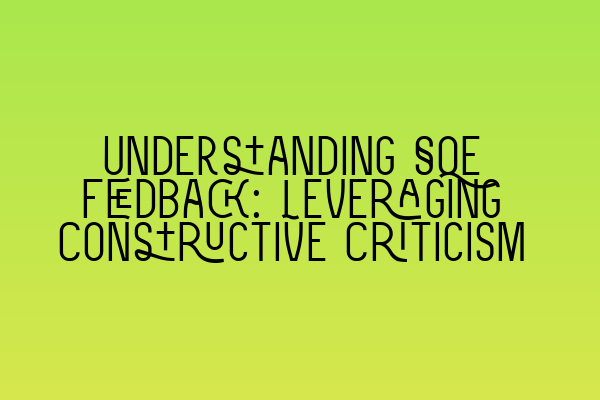Understanding SQE Feedback: Leveraging Constructive Criticism
As aspiring solicitors, it is inevitable that we will receive feedback on our performance throughout the SQE training process. Feedback is a valuable tool that can help us identify areas of improvement and make necessary adjustments to reach our full potential. In this blog post, we will explore the importance of understanding SQE feedback and discuss how we can leverage constructive criticism to enhance our skills and knowledge.
What is SQE Feedback?
SQE feedback refers to the comments and evaluations provided by trainers, mentors, and assessors during the SQE training program. The aim of this feedback is to provide candidates with an objective assessment of their performance, highlighting strengths and areas for improvement.
Importance of Understanding SQE Feedback
Understanding and embracing feedback is crucial for professional growth. It helps us identify our strengths, weaknesses, and blind spots, allowing us to make necessary adjustments and improvements. SQE feedback serves as a guide to our development, enabling us to become competent solicitors.
Leveraging Constructive Criticism
Constructive criticism is an essential part of the SQE training process. It provides valuable insights into our performance and enables us to refine our skills. Here are some strategies to effectively leverage constructive criticism:
1. Welcome Feedback: Instead of viewing feedback as a personal attack, embrace it as an opportunity for growth. Understand that feedback is given with the intention of helping you improve and succeed.
2. Listen Carefully: When receiving feedback, listen attentively and avoid becoming defensive. Ensure you fully understand the comments and ask for clarification if needed.
3. Analyze the Feedback: Take the time to analyze the feedback, identifying recurring themes or areas of improvement. Reflect on how the feedback aligns with your own self-assessment and previous feedback received.
4. Take Action: Use the feedback as a roadmap for improvement. Create an action plan by setting specific goals, and implement strategies to address the identified areas of improvement.
5. Seek Guidance: If there is a particular aspect of your performance that you are struggling with, don’t hesitate to seek guidance from trainers, mentors, or colleagues. They can provide valuable insights and suggestions for improvement.
6. Practice, Practice, Practice: Incorporate feedback into your practice sessions. Whether it’s legal drafting, client interviews, or advocacy skills, continually seek opportunities to practice and apply the feedback received.
7. Monitor Progress: Regularly review your progress and evaluate whether the implemented changes have had the desired impact. This self-assessment will help you refine your approach and make further adjustments if necessary.
By leveraging constructive criticism, you can enhance your performance, skills, and knowledge throughout the SQE training process. It is important to view feedback as a stepping stone towards becoming a competent solicitor.
Related Articles:
– Tenant Rights in the UK: Understanding Your Legal Protections
– Legal Considerations in Residential Leases: Essential Insights for Solicitors
– Lease Laws in the UK: Unraveling the Legal Framework for Tenants
– Workshops on Land Law: Hands-On Training for Effective Practice
– Differences Between Commercial and Residential Property Laws: Examining Contrasting Regulations
In conclusion, understanding SQE feedback and leveraging constructive criticism is vital for your professional growth as a solicitor. By embracing feedback, analyzing it thoughtfully, taking action, and monitoring your progress, you can enhance your skills, knowledge, and performance. Remember that feedback is a valuable tool that can guide you towards becoming a competent solicitor.

Leave a Reply